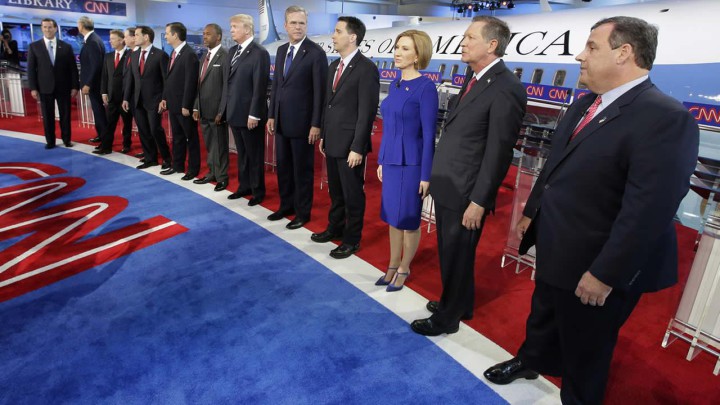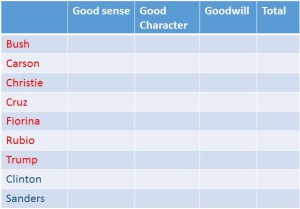How To Choose Your Candidate
I got the idea for this post last week while I was conducting a training class on executive-level presentations. We were covering “executive presence” and I was comparing the concept to Aristotle’s idea of ethos as one of the three principal paths to persuasion. One of the participants asked me—totally out of context, I thought—what I thought of Donald Trump.
I replied that it would be unprofessional for me to share my personal opinion, as it would be irrelevant to the material being taught and could only lead to distraction (in lean terms, totally wasteful) , but I did seize the opportunity to turn the question around and ask them to apply Aristotle’s test to a real-life example, and that’s what I share here with you.
Aristotle taught us that the three available means of persuasion are logos (logic), pathos (emotion), and ethos (the perceived qualities of the speaker), and he claimed that ethos is the most important of the three. I would dispute that, because I think that any one of the three can be paramount depending on the situation; e.g. logos may come first if it’s a purely technical issue, and pathos may rule in a matter of personal taste. But, in the case of electing the leader of our nation for at least the next four years, ethos has to be first.
Ethos has to be first, if only because the product each candidate is selling is themselves. But it’s also critical because the future is so uncertain, and the most pressing issues in this election cycle may be totally forgotten by the second day after the inauguration. The emotions that people feel today—and anger appears to be the dominant emotion in the Republican primary—are poor guides to a decision with such lasting consequences, particularly as they are so easily manipulated by the political machinery. Logos is out as of now because at this stage in the primary cycle nobody listens to detailed policy prescriptions anyway.
So, how do you measure ethos? Although you probably already have a gut-level feel of where you would place each of the candidates on the ethos scale, your vote is important enough to merit a deeper look. Ask yourself these three questions:
Does the speaker show good sense?
Does the speaker show good character?
Does the speaker show goodwill?
Good sense: The key here is not to use your level of agreement with the person’s logic as a measure of good sense; that would be logos. Good sense in a political candidate is shown by how they think, not what they think. For example, there are some candidates whose positions I disagree with, but I respect their approach to the question. Politics is the art of the possible, so they have to be pragmatic: will they be able to work with other people, will they be able to engage in outside-in thinking and take the perspective of the other side as well as their own? Do they think deeply about the issues, and are their assessments and descriptions of the issues anchored in concrete and facts and data, or are they only FOG: “Fact-deficient, obfuscating generalities”?
Good character: Character has long been one of the most important factors in American politics, but in this election cycle, we appear to be in uncharted waters with regard to its relevance. It was not that long ago that allegations of plagiarism during law school knocked a candidate out of the Presidential race; today, it seems that any skeleton can come safely out of the closet and be ignored. But I think it’s only because fear, anger and frustration—pathos—are currently overwhelming these questions, and they will eventually loosen their grip on voters’ judgment. These questions will reassert themselves: Does the person appear to be honest? Have they shown a tendency to do the right thing in the past? Do they share your values, and do they appear to live up to them?
Goodwill: Does the candidate appear to have the best interests of the audience at heart, or is he or she seen as lonely out for themselves? Do you get the sense they would do the right thing for you even if it is personally costly to them? Do they have your back, or just worship their own backside? Would they say or do anything just to get elected?
It’s important to note that ethos is not something the speaker “has”, so much as it’s a quality that the audience ascribes to him or her. In other words, ethos is in the eye of the beholder, which means that you are the ultimate judge. That’s why I did not directly answer the question that was asked of me in the class, nor do I here. My opinion does not matter, only yours does. To help you in your decision, here’s a template that you can use before you pull that lever:






